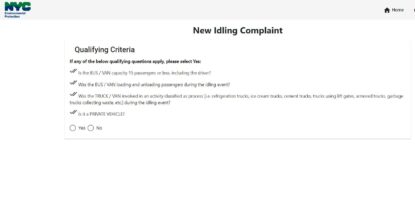
An image of the Idling Complaint portal. The proposed bill would require the portal to be translated into ten additional languages. Image Credit: NYC DEP.
On February 2, 2023, City Council Member Alexa Avilés introduced Int. 898 at the full Council meeting. The bill would require the New York City Department of Environmental Protection to translate its Citizen’s Air Complaint Portal into ten, non-English “designated citywide languages.”
The portal, which can be found on the Department of Environmental Protection’s website, is available for use by any person to report idling vehicles. In New York City, it is illegal for the driver of a gasoline or diesel motor vehicle to idle for longer than three minutes, or one minute while next to a school. Special rules also exist for busses when loading or unloading passengers. People who suspect that illegal idling has taken place can use the portal to report the incident to Environmental Protection. The program is used to supplement complaints made to the City’s 311 services and to expedite the process of responding to reported violations. A person who makes a complaint through the portal shall receive 25 percent of any proceeds collected by the City through the imposition of a $350 civil penalty.
The new proposal would require Environmental Protection to translate the complaint portal, and all webpages that explain how to use the portal, into each of the ten designated citywide languages. These languages are Spanish, Chinese, Russian, Bengali, Haitian, Korean, Arabic, Urdu, French, and Polish.
Council Member Avilés’s Communications and Organizing Manager James Neimeister provided Cityland with details on the Council Member’s motivations for introducing the bill. According to Neimeister, the idea for the bill came from complaints from constituents and from environmental advocates who hope to make the portal more accessible in order to facilitate more idling complaints. Neimeister indicated that idling has been the focus of much environmental advocacy and policy change in recent years. Int. 898 is intended to build on Int. 606 of 2022, which Council Member Avilés also introduced. Int. 606 would impose more severe idling penalties for violations near parks and green spaces.
While the primary motivation for Int. 898 appears to be environmental protection, the bill also serves the dual purpose of addressing language-access inequities as well. Neimeister indicated that a concern is that the portal is difficult to locate and access in general, with the problem being exacerbated for non-English speakers by a lack of language inclusion. The hope is that Int. 898 will spark a conversation about making the portal more user friendly, more accessible and will inform New Yorkers about their ability to report idling violations.
Int. 898 has been referred to the City Council Committee on Environmental Protection for further consideration. No public hearing has been scheduled to date.
By: Ryan Myler (Ryan is a New York Law School student, Class of 2024.)
CC: Stated Meeting, Int 898-2023 (February 2, 2023.)

